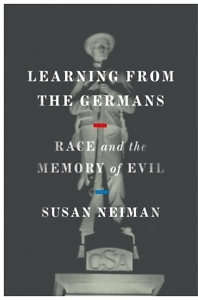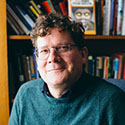Deflection and Redemption
Susan Neiman considers America’s moral possibilities in Learning from the Germans
In the moments of conversation that thoughtful people everywhere entertain after uncomfortable meetings, parties, visits with family, and other social exchanges, there’s a popular expression that signals a holding of space for one another: “That was weird, right?” If even one other person responds with “Yes, that was weird,” an opening has occurred. A modicum of solidarity or a mutual sense of sanity has been shared.

Depending on the context, such candor can serve as a small step toward understanding something more dramatic and consequential: “That wasn’t normal. Something is wrong.” Remembering rightly together is the little deal which, when multiplied, adds up to the very big deal we try to conjure with words like “civilization” and “free world.” In thinking these matters through, we’ve been given a gift in Susan Neiman’s Learning from the Germans: Race and the Memory of Evil. Through anecdote, testimony, and research so thorough that it begins to look like a years-long act of love, Neiman explores moral responses in postwar Germany and throughout the American South. She’s looking for overlap, and she finds it everywhere, both in missed opportunities and overlooked but already underway efforts. As a Jewish mother of three who lives in Berlin but grew up in Atlanta, Neiman comes by her hopeful realism concerning memory and healing honestly.
Just as one marvels to hear that West German president Richard von Weizsäcke, a former Nazi soldier, declared May 8, 1945, a day of liberation for the German people in 1985, Neiman reminds us that related breakthroughs, generally unpublicized and almost instantly forgotten by many, are occurring in America all the time. President Obama used the occasion of eulogizing pastor and South Carolina state senator Clementa Pinckney (murdered by white supremacist terrorist Dylann Roof) to note that removing the Confederate flag at the state capitol would serve as a straightforward statement that slavery was wrong. He put the matter biblically: “By taking down that flag, we express God’s grace.” Activist Bree Newsome took the matter into her own hands the very next day.
 Neiman would have us look hard at missed opportunities and roads not (yet) taken, but she also turns our attention to paths of resistance taken by a few. While monuments in Munich to the German teenagers Hans and Sophie Scholl (beheaded in 1943 for printing anti-Nazi leaflets) seem to suggest that resistance to Hitler on the part of the average German meant martyrdom, Neiman pauses at a monument in the Rosenstrasse which commemorates the actions of women with Jewish husbands who, after watching their spouses get arrested in preparation for deportation, stood outside the facility where the men were detained for a week, demanding their release. In this case, the totalitarian government blinked and the men were freed, demonstrating, Neiman notes, “that right could overcome wrong with no weapons at all.”
Neiman would have us look hard at missed opportunities and roads not (yet) taken, but she also turns our attention to paths of resistance taken by a few. While monuments in Munich to the German teenagers Hans and Sophie Scholl (beheaded in 1943 for printing anti-Nazi leaflets) seem to suggest that resistance to Hitler on the part of the average German meant martyrdom, Neiman pauses at a monument in the Rosenstrasse which commemorates the actions of women with Jewish husbands who, after watching their spouses get arrested in preparation for deportation, stood outside the facility where the men were detained for a week, demanding their release. In this case, the totalitarian government blinked and the men were freed, demonstrating, Neiman notes, “that right could overcome wrong with no weapons at all.”
In Mississippi, which some of her subjects refer to as the Broadway of the Civil Rights movement, Neiman sees something like this happening in the long-haul efforts of the William Winter Institute for Racial Reconciliation in Oxford, where founding director Susan Glisson and her team train and engage in the work of making space for one another’s stories. As Glisson puts it, “They say talk is cheap, but only cheap talk is cheap. Honest purposeful talk works.”
Something of this ethic is evident too in her exchanges with James Meredith, still devoted to candor and good humor after all these years (proudly donning an Ole Miss hat, for instance). He loves to hear tell of the stumbling stones that appear throughout Berlin, commemorating the names and birthdates of victims of the Nazi regime, but he doubts that such efforts will gain ground in America anytime soon: “It’s hard when you promise God you ain’t going to lie no more. You have to think before you say anything.”
But those very stones, as Neiman demonstrates, have inspired Bryan Stevenson of the Equal Justice Initiative, who hopes The Legacy Museum in Montgomery, Alabama, achieves a similar effect, restoring (or waking as if for the first time) the moral senses. Shame, as Stevenson sees it, can be a good starting point. Or as Neiman observes: “Shame hurts. Guilt hurts. They are not emotions we willingly feel. We seek admiration from the outside and peace from within, and we have powerful ways to deflect everything that threatens them. Rather than acknowledging our complicity in something shameful, we forget with remarkable ease.”
Neiman would have us take up the rare and righteous work of remembering rightly. And in our day, when a bust of a white supremacist terrorist sits in Tennessee’s state capitol undisturbed, this work is especially needful.

David Dark is the author of five books, including The Possibility of America, Life’s Too Short to Pretend You’re Not Religious, and The Sacredness of Questioning Everything. He lives in Nashville and teaches at the Tennessee Prison for Women and Belmont University.


